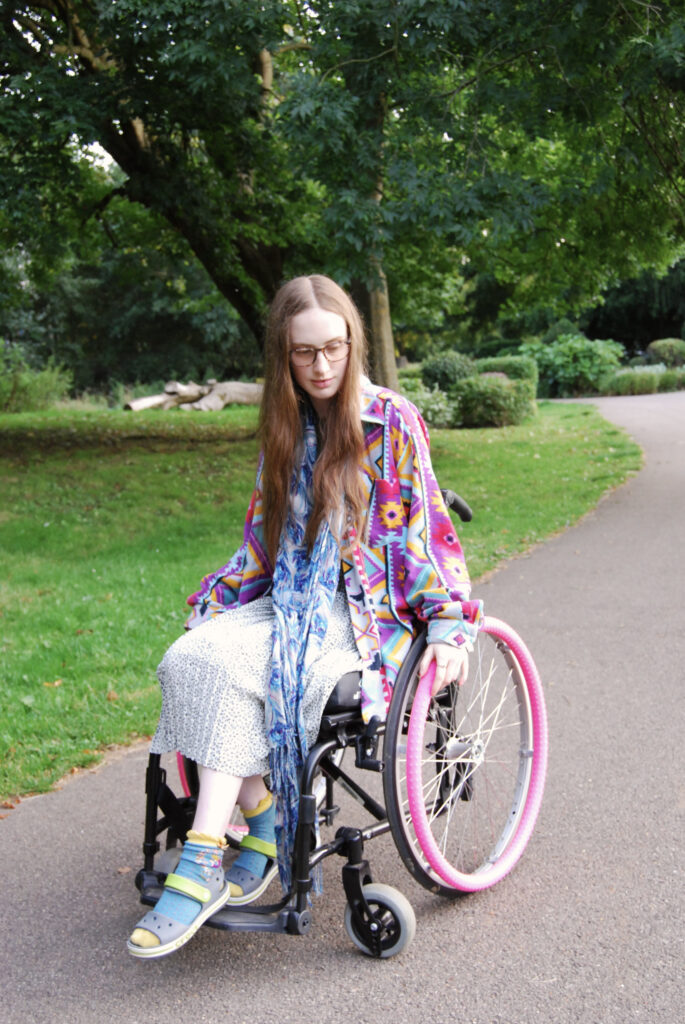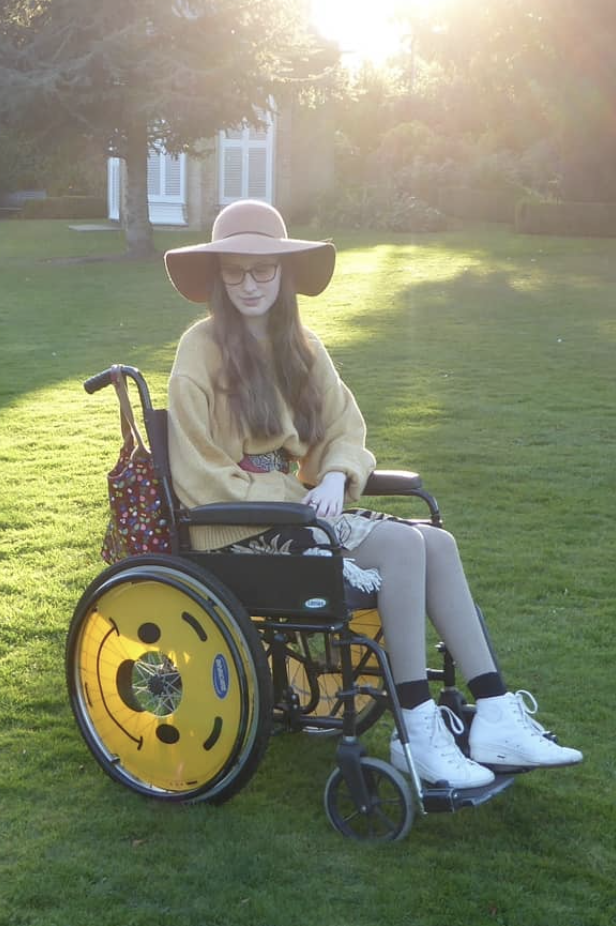I forget how the journey to accepting my wheelchair used to feel. I felt bad for not being able to brazen it out, be like the cool women I saw on the internet, seeming proud in their disabled existence. But some days, that just couldn’t be me.
I want to take the hand of my teenage self, to be there when she asks her mum to take her straight back out of the chip shop because those kids are staring at her, to be there when she wears quirky clothes as a defence, a way to distract the people who look her up and down. To be there when she hid her face to avoid being noticed by anyone she knew, avoid the awkward questions which were sure to follow.

I first used a wheelchair as a child.
I don’t remember feeling self-conscious as a child as anything was better than not being able to get out. My condition fluctuates so, in the following years, I almost forgot I had a wheelchair. For some time it was rare that I’d use it. Then, as a teenager, I needed it again. My friends were slowly introduced to it, all 2 of the people I saw in person and went out with at that time. I was so grateful to them, I still am. They’re not heroes for being friends with a wheelchair user, but they are brilliant friends for making it fun. For pushing me fast down hills, making games out of this situation, and adjusting so naturally because it’s just me. Sitting in a chair that has wheels. I’m so glad I know people who know that.

However, it wasn’t all sunshine and free-rolling freedom.
There were days like that one with my mum in the chip shop. There was hiding my face in town when the kids got out of school, because I couldn’t face another well-meaning “What happened!!?”, another conversation where it was my job to explain the existence of chronic, fluctuating conditions to a bunch of teenagers who are all someone’s child, who all live in this society which should’ve taught them better so I, another child, wouldn’t have had to.
I’ve had other disabled people comfort me in the street.
Like the time when somebody saw me crying my way out of that chip shop in my chair, sat next to me and said everything I needed to hear. I will forever cherish their kindness. I want to be that person for anybody reading this post. Let me sit with you and say their ignorance is not your responsibility. But at the same time, your discomfort around it is understandable.

“Their ignorance is not your responsibility”
I thought it was my fault nobody understood. I had to find the right explanation, I had to craft the perfect analogies, the simple explain-all metaphors, I had to have the answers. But I was a child. I am a human. These things shouldn’t have been required of me just to get by in classroom conversation. And they shouldn’t be asked of you either.
“…But your discomfort is understandable”
The flip side to feeling like I owed the world my 3-inch thick medical file (edit: okay, they were thicker than that) as explanation for why I was on wheels or not doing PE, was feeling like I should be able to breeze through any stare or awkward question like the stunning human I am, with a perfectly executed hair flip in place of any backward glance. But we are a part of this society. So being ignored, ostracised, or misunderstood by the rest of it hurts. You’re allowed to have feelings. You’re allowed to wait to try that coat on in the charity shop until nobody’s looking, so you can stand up to get it on more easily, without getting any funny looks. You’re allowed to rush out of that shop and miss out on the chips this time, if it’s just not a day when you can deal with that.

And if you’re anything like me, you’re allowed to forget you were ever uncomfortable with this life, then one day suddenly realise that all those jokes you tell? Yeah, sometimes saying “it’s a miracle!” and giggling as you stand up is a deflection tactic. Yeah, maybe that discomfort isn’t as gone as you thought. And that’s okay too.

I’m not saying this situation is “okay” all around. I’m saying those tears are understandable. I’m saying that if this anxiety or discomfort is stopping you from going out at all when you feel well enough to, then yes it’s something you need to process (maybe talk through it with someone- anyone supportive from a counsellor who can chat it through properly, to a friend who could go with you on difficult outings) but do so with kindness. Do so in context. The context being: this is difficult. You are human. Those attitudes sting. Sometimes the tears will send you home. And that’s okay because: it doesn’t mean you’ll never go out again.

A wheelchair is a chair
You can’t stand up for the whole meeting? The whole film? The whole meal? Well, I can’t stand up right now either. Only my chair has wheels so I can still move. Not sure what makes me tragic in comparison to you…

A wheelchair is just a mode of transport
You can’t walk to the next town? Use a car. I can’t walk to the next shop, so I use a wheelchair.
Some of these thoughts and experiences are unique to ambulatory wheelchair users- those feelings of awkwardness around showing we can stand, move our legs or walk around. Others, I imagine, are true whatever the context of wheelchair use; the stares, the awkward conversations, the comments and inappropriate invasions of personal space.

The quality of the chair makes a difference:
Not all wheelchairs are created equal
Recently, a new chair became mine on long term loan from a friend. I feel more confident using it, even if the lack of larger side panels means my long coats now get caught on the wheels and I wish I didn’t get rid of that cropped jacket recently… Anyway, I think a full comparison of my old and new wheelchair experiences is a topic for another post, but I must mention it here because the quality of the chair changes the experience of using it. Which sounds obvious, I know. But it can show in unexpected ways, like all the awkward setbacks of confidence feeling that bit easier to get through. The difference between gliding along in a well-made chair and rattling around in a £50 travel model can’t be understated, and isn’t fair. (On a lot of levels, hence it being a topic for another time.)

Being seen by others
Now days, I am the disabled person other wheelchair users see. Somebody using a mobility scooter in a supermarket complimented me on both my chair and my style recently. It was a highlight of my day (which is saying something considering that’s the day I bought my new phone!!). It was a special moment in a way I can’t explain. I felt a sense of community and understanding that has always been rare in my life.
I’ve also started posting more to social media, saying the things I already know. Before, I had forgotten how hard they were to learn. Now that I’ve remembered, I want to share those lessons with anybody who’s still processing the things I’m content with.
It’s easy to forget how much somebody else may need to see someone like you living your life and having a voice. Because when ‘someone like you’ is someone a lot like them, it can be invaluable.

I think a lot about being positive representation for other wheelchair users, chronically ill and disabled people. However, I think the best way I can be that isn’t just by crafting posts intentionally aimed at that goal. It’s by living my life. A post stating that I’m a positive disabled role model is as shallow as a piece of paper it could be printed onto. Living my life, working on myself, my career and my happiness; those things run deeper. Those things are what we all need. To be valued as three (3) dimensional human beings with hopes and emotions, dreams and value. That’s what’s beautiful to me about scrolling through “babe with a mobility aid” photos; the individuals. We make this community what it is, you make this community what it is.
When people stared at me they saw an anonymous ‘girl in a wheelchair’, when my friends look at me, they see Sakara. Sakara using her chair the same way anyone else might be wearing shoes or riding a bicycle.

My disabled identity is important to me, and that’s why I want to finish this post by saying “Disabled” isn’t a one-dimensional, reductionist label to hold. It’s a door onto complexities, cultures, and insights many other people simply don’t gain. A big part of the sting in people staring or asking questions is their failure to hold an awareness of these depths and truths. We need to be valued as we truly are, rather than being reduced to stereotypes or the subjects of idle, insensitive curiosities.
Remember: there ignorance is not your responsibility, but your discomfort is understandable (and shared!).
All my love,
Sakara.

If you enjoyed this post you might like “What Accessible Fashion Means To Me” where I run through how my disability has changed my relationship with clothes and styling.
I’m also on Instagram, Tiktok, Twitter and Facebook (I’ve been busy!)


Love it. I get really bad looks from people I haven’t used the it’s a miracle one yet but I do say some fu’s under my breath.CRPS is real and I’m blessed that I can ambulate sometimes with arm crutches sometime I can’t.
Cheers